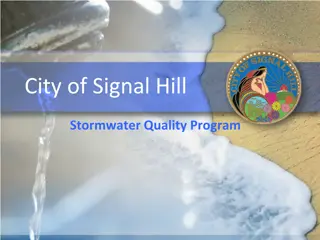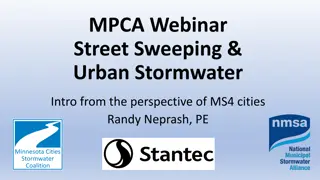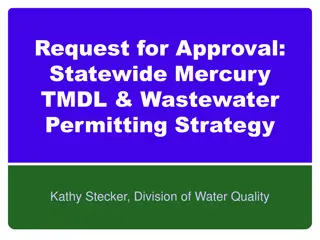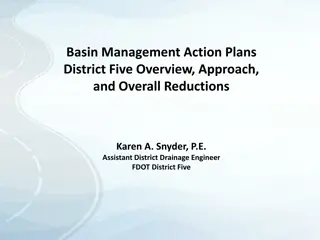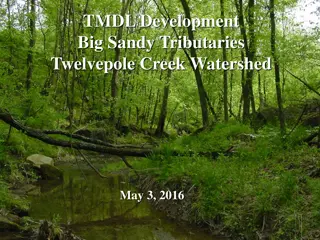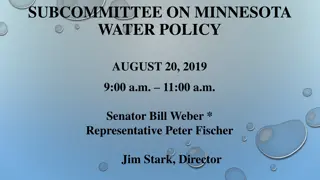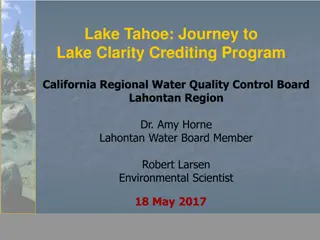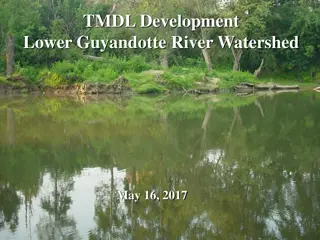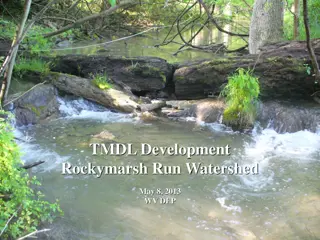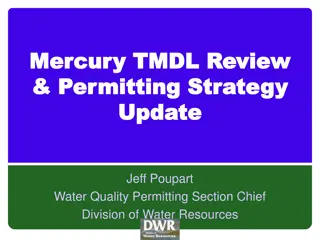Statewide TMDL Advisory Group Meeting - March 11, 2024
This Statewide TMDL Advisory Group meeting held on March 11, 2024, featured discussions on various topics including member introductions, water quality standards, TMDL prioritization framework, monitoring projects, nutrient standards, public comments, and upcoming meeting topics. STAG members from d
2 views • 40 slides
City of Signal Hill Stormwater Quality Program Overview
The City of Signal Hill, known for its unique geographic characteristics and historical oil production legacy, is proactive in implementing stormwater quality programs. The city addresses MS4 and TMDL requirements, demonstrating regional leadership in environmental initiatives. With a population of
1 views • 42 slides
Enhanced Street Sweeping for Effective Stormwater Management
Street sweeping plays a significant role in removing phosphorus and pollutants from urban environments. By implementing enhanced street sweeping programs based on tree canopy cover and phenology, cities can achieve cost-effective pollution reduction and meet TMDL WLAs. This approach can be integrate
0 views • 5 slides
Statewide Mercury TMDL & Wastewater Permitting Strategy Overview
Statewide Mercury Total Maximum Daily Load (TMDL) program implemented in North Carolina has aimed at a 67% reduction in total mercury loading since 2002. The Wastewater Permitting Strategy has successfully resulted in a 99% compliance rate among facilities, ensuring low mercury contributions. Monito
0 views • 22 slides
Basin Management Action Plans in FDOT District Five
This overview discusses the implementation of Basin Management Action Plans (BMAPs) in Florida Department of Transportation (FDOT) District Five to address impairments, meet Total Maximum Daily Load (TMDL) requirements, and involve stakeholders in water quality monitoring and restoration efforts.
0 views • 16 slides
Understanding TMDL Development in Watershed Management
Explore the essential concepts of Total Maximum Daily Load (TMDL) development in watershed management, including the significance of impaired streams, numeric and narrative criteria for water quality standards, and the process of developing TMDLs to restore and maintain healthy water bodies. Gain in
5 views • 30 slides
Understanding TMDL Development in West Virginia
TMDL development in West Virginia focuses on restoring impaired streams by setting pollutant budgets. The process involves defining impaired waters, implementing monitoring plans, and complying with Clean Water Act regulations. Numeric and narrative criteria are used to evaluate water quality standa
0 views • 30 slides
Subcommittee on Minnesota Water Policy Meeting Highlights
The Subcommittee on Minnesota Water Policy meeting held on August 20, 2019, covered various important topics such as updates on Minnesota and Mississippi Rivers, long-term sediment data importance, proposed legislative water policy issues for 2020, and stakeholder meeting discussions. Presentations
0 views • 8 slides
Understanding TMDL Development in West Virginia
Explore the TMDL development process in West Virginia, including water quality standards, impaired waters, and the role of TMDLs in restoring water quality. Learn about the criteria for impaired streams, numeric and narrative standards, and the assessment methods used to identify sources of impairme
0 views • 28 slides
Enhancing Flow Opportunities in Scott Valley Groundwater Study
The Scott Valley Groundwater Study identifies flow enhancement opportunities to improve water management and increase stream flows. Initiatives include developing an integrated hydrologic model, exploring water management strategies, and implementing groundwater recharge projects since 2008. The stu
0 views • 6 slides
Understanding Lake Tahoe's Environmental Challenges
The Lake Tahoe Total Maximum Daily Load (TMDL) program aims to restore Lake Tahoe's clarity by addressing pollution sources such as nitrogen, phosphorus, and fine sediment particles. The program involves a science phase, regulatory strategy phase, and implementation phase to reduce pollutant loading
0 views • 27 slides
Understanding TMDL Development in Water Quality Management
Exploring the Total Maximum Daily Load (TMDL) development process for impaired streams, including definitions of TMDL, impaired streams, numeric criteria for pollutants like fecal coliform bacteria and selenium, and narrative criteria to protect aquatic ecosystems. The content covers the necessity o
1 views • 24 slides
Understanding Total Maximum Daily Load (TMDL) Development in West Virginia
Explore the process of TMDL development in West Virginia, including background on water quality standards and impaired waters. Learn about the significance of TMDLs in maintaining healthy streams and the criteria for determining impaired streams, such as numeric and narrative standards. Discover how
0 views • 28 slides
Mercury TMDL Review and Permitting Strategy Update for Water Quality Protection
Reviewing the Total Maximum Daily Load (TMDL) of mercury in water bodies, its impacts on aquatic life and human health, and strategies for permitting to ensure compliance with environmental standards. Includes an overview of mercury sources, regulatory approvals, reduction targets, and monitoring co
0 views • 12 slides

